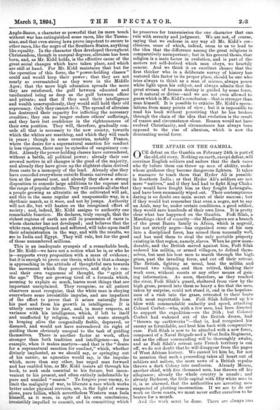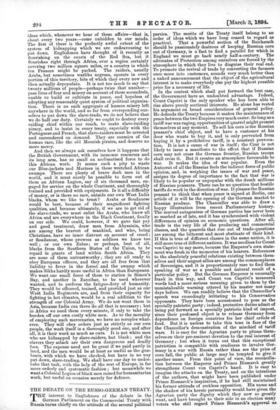THE AFFAIR ON THE GAMBIA.
OITR defeat on the Gambia on February 24th is part a the old, old story. Nothing on earth, except defeat, will convince English soldiers and sailors that the dark races who fly before them can throw up men of ability, under whose guidance they become dangerous fighters. It takes, a massacre to teach them that Hyder Ali is possible in Southern India ; or that Hyder Ali's soldiers are not, mere "natives," and if they had had to fight King Chaka they would have fought him as they fought Lobengula. and have been summarily wiped out. Their contemptuous daring is no doubt one main secret of their success ; but if they would but remember that even a negro, not to say an Arab, may be, under certain conditions, a good soldier,. they would save hundreds ef their own lives. It is pretty clear what has happened on the Gambia. Fodi Silah, a, Mandingo chief of capacity—the Mandingoes are a branch of the great Bantu family in Africa, which is negroid,. but not strictly negro—has organised some of his men into a disciplined force, has armed them unusually welll and has used them to steal the only portable property existing in that region, namely, slaves. When he grew unen- durable, and the British moved against him, Fodi Silah ordered his militia, or armed villagers, to defend them- selves, but sent his best men to march through the high; grass, past the invading force, and cut off their retreat.
The British, fighting as usual, beat the militia and burned two villages, and then retired, thinking their work over, without scouts or any other means of gain- ing information. As soon, therefore, as they reached the river, Fodi Silah's guard, sheltered from view by the high grass, poured into them so heavy a fire that the men, taken by surprise, could not stand it, and in the hopeless- ness of a, rush into the grass, retreated to their boats. with most regrettable loss. Fodi Silah followed up his. blow with commendable audacity and speed, attacking Colonel Corbet,—who, with a few men, had been directed to support the expedition—on the 26th; but Colonel. Corbet had wakened out of the British dream, hail "thrown up earthworks "—that is, had recognised his enemy as formidable, and beat him back with comparative ease. Fodi Silah is now to be attacked with a new force,. composed of a Naval Brigade and a West India Regiment, and as the officer commanding will be thoroughly awake,. and as Fodi Silah's retreat into French territory is cut off, we do not doubt that he will disappear from the pages of West African history. We cannot let him be, for not to mention that such a proceeding takes all heart out of soldiers and sailors, the mere news of a British repulse throws a dark Colony into confusion. Already Mousa, another chief, with five thousand men, has thrown off his allegiance ; already the whole country is unsafe ; and already Bathurst, the little capital with fifty white men in it, is so alarmed, that the authorities are arresting men suspected of plotting insurrection. If we are to do our work on these coasts, we must never suffer ourselves to be beaten for a month.
And the work must be done. There are always tyro ideas which, whenever we hear of these affairs—that is, about every two years—come unbidden to our minds. The first of these is the perfectly awful extent of the system of kidnapping which we are endeavouring to put down. Englishmen have thought of it recently as flourishing on the coasts of the Red Sea, but it flourishes right through Africa, over a region certainly covering two million square miles, or a country in which ten Frances might be packed. The raiders, usually Arabs, but sometimes warlike negroes, operate in every portion of this territory, bits of which they every now and then actually depopulate. It is not too much to say that twenty millions of people—perhaps twice that number— pass lives of fear and misery on account of these scoundrels, unable to build or cultivate in peace, and hopeless of adopting any reasonably quiet system of political organisa- tion. There is no such aggregate of human misery left anywhere in the world, and so far from overspending our- selves to put down the slave-trade, we do not believe that we do half our duty. Certainly we ought to destroy every raiding chief within our reach, to make slave-raiding piracy, and to insist in every treaty, especially with the Portuguese and French, that slave-raiders must be arrested and surrendered on demand. They are enemies of the human race, like the old Moorish pirates, and deserve no more mercy.
And then we always ask ourselves how it happens that the British Government, with its immense resources and its long arm, has so small an acclimatised force to do this African work. It seems such a pity to waste our Bluejackets and Marines in these wretched African swamps. There are plenty of brave dark men in the world, and it must surely be possible to form out of them an African Legion, say of six thousand men, en- gaged for service on the whole Continent, and thoroughly trained and provided with equipments. Is it all a difficulty of money, or is there no race, outside our own West India blacks, whom we like to trust? Arabs or Soudanese would be best, because of their magnificent fighting qualities, and because ultimately, if we are to get rid of the slave-trade, we must enlist the Arabs, who know all Africa and are everywhere in the Black Continent, finally on our side. We could, however, if we gave fair pay and good treatment, draw men from Abyssinia, who are among the bravest of mankind, and who, being Christians, have no inner distrust on account of creed ; or Soudanese, whose prowess as soldiers we know too well ; or our own Zulus ; or perhaps, best of all, blacks from the Southern States of the -Union, to be repaid in grants of land within South Africa. They are none of them untrustworthy ; they are all ready to obey European officers, and they are all free from that liability to fever in the forest and the swamp which makes Sikhs hardly more useful in Africa than Europeans. We want one small force of them to station in Simon's Bay, and another in Zanzibar, to be used wherever wanted, and to perform the fatigue-duty of humanity. They would be officered, trained, and provided just as our West India Regiments are, and from their capacity for fighting in hot climates, would be a real addition to the strength of our Colonial Army. We do not want them in Asia, because India can there do all that is necessary ; but in Africa we need them every minute, if only to take the burden off our own costly white men. As to the morality of employing such mercenaries, we have no scruples what- ever. They will obey orders just as strictly as our own people, the work itself is a thoroughly good one, and after all, it is their work as much as ours. It is not white men who are kidnapped by slave-raiders, but black ; and the slavers they attack are their own dangerous and deadly foes. The expense need not be great if we paid partly in land, and the men would be at least as useful as the gun- boats, with which we have checked, but have in no way put down, slave-trading. We shall have one day to under- take that task, with the help of the rest of Europe, in far more orderly and systematic fashion ; but meanwhile we want a Colonial Legion of black men raised for humanitarian work, but useful on occasion merely for defence.







































 Previous page
Previous page